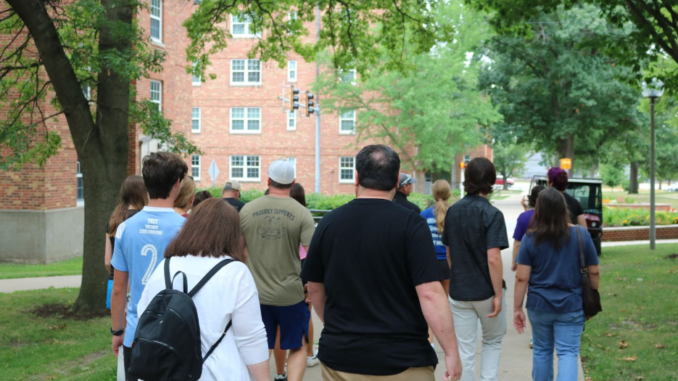
The total operating budget for the fiscal year of 2023 at Truman State University will be $114 million, a decrease from last year’s $121 million, said Dave Rector, vice president of finance and administration at Truman.
The budget breaks down into three pieces. The first section is the education and general budget, which is funded by money from the state and student tuition. The education and general budget funds items such as faculty salaries. This budget will be $85.72 million this year. The second section is the auxiliary budget which funds items such as residence halls and athletic centers. The budget for these expenses is $17.17 million. Finally, the third section is allocated to the restricted funds, which is primarily made up of money supplied by the Federal Government. This adds up to about $11.38 million.
Over the past five years, the budget has slowly decreased. The previous fiscal year had a budget of around $121 million. Rector said the two main features at play in this decrease are a decline in enrollment and a decline of students living on campus. As a result, less money is going into the University.
The COVID-19 pandemic also significantly impacted the University budget. When students left campus as the pandemic began, the University refunded their money spent on housing and meal plans. Money supplied from the Federal Government via stimulus provided relief to the University and students amid the crisis. Rector said the University invested most of the provided money into upgrading technology in the University, such as better internet access in the residence halls.
Rector said the University has worked to remain within their revenue and maintain a balanced budget.
Enrollment among new freshmen for fall 2022 appears to be slightly higher relative to last year, said Tyana Lange, vice president for enrollment management and marketing. In addition, Lange said she believes that enrollment for international students will be slightly higher as well, however, enrollment of new graduate and transfer students will be lower for this upcoming semester. An official University census will take place 15 days into the fall semester to determine the total student population.
Enrollment has declined in recent years and Lange said reaching previously higher numbers, such as 1,200 a year, is not possible due to the numbers of people graduating high school and continuing onto college. She said they believe it is possible to bring enrollment up to 800, 900 or even 1,000 people a year. Measures such as earlier communication with students and encouraging students to visit campus are being implemented to attract more students to Truman. Campus visits from prospective students will receive higher funding as well since in the past, data has shown around 50% of students visiting campus then choose to attend Truman.
Lange said they focused on increasing the yield of students, the amount of admitted students that choose to go to the University, relative to the previous year. This year will feature a higher yield than last year, Lange said.
“We really focused this year on making sure students were connected to the University and those that raised their hand and said ‘yeah, I’m thinking of coming here’, definitely come here,” Lange said.
Associate Director of Admission, Hayden Wilsey, said there were other measures they have implemented to increase enrollment. Wilsey said visits are important in recruiting students to attend the University. He said he hopes to encourage more prospective students to visit the campus this year.
Wilsey also said they did a more effective job tracking data with students as they moved through the enrollment process. For instance, this was the first year the University utilized an enrollment deposit, giving them an additional datapoint to look at where students were in the admission process.
Wilsey said he viewed the successes of this year as being the culmination of work of the set of directors over several years.
“This has been the story of the past few years,” Wilsey said. “We keep asking the question. Is this working or not? If it is working, how can we do it better? If it is not working, what can we do to get it there? I think across the board, we’re in a really great spot in terms of what our team is able to do.”
Wilsey said they are implementing measures to improve outreach to other areas as well. A recruiting counselor has been relocated to Kansas City to better reach high school students living in that region. They are also working to send out more regular mail to students and working to reach out to juniors, sophomores, and freshmen. In addition, they are working to expand outreach to transfer populations from community colleges and other four-year universities.
Wilsey said he encourages students to contact him directly to tell him their story on why they choose to come to Truman. Students can reach him via email hwilsey@truman.edu
